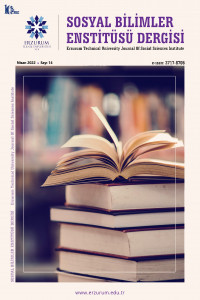VIRGINIA WOOLF’UN MRS DALLOWAY KİTABINDA SOSYAL SİSTEM KRİTİĞİ
Virginia Woolf
patriarkinin kadınların beyinlerini ve özgürlüklerini zapt ettiğinin
farkındaydı fakat her şeyin başında olan erkek gücünü de yadsıyamazdı. Woolf
kaleme aldığı romanlarla sosyal sisteme direk bir saldırıda bulunmamasına
rağmen kendi öz benliğini yansıttığı kadın karakterleri sayesinde kadın
okuyucularına içlerinde bulundukları sistemin onları nasıl hapsettiğini
göstermeyi hedeflemiştir. Woolf’un çağdaşlarının değerlerine göre basit bir
anlatım örgüsü bulunan Mrs Dalloway, Woolf’un sisteme karşı öfkesiyle sanatını
sentezlediği en güzel örneklerden biridir. Woolf okuyucularına hayattan anlam
çıkarmanın ve kendi benliklerini ortaya koymanın yollarını feminist bir
propaganda ile değil farklı anlatım teknikleri, yenilikçi dil, ve ironi
kullanımıyla zenginleştirdiği modernist hikayeleriyle göstermeye çalışmıştır.
Yazılarında statükoya karşı çıkmıyormuş gibi görünse de erkek söylemini yıkan
yenilikçi yazımı kadınların maruz kaldığı durumları anlatmanın aracı olmuştur.
Anahtar Kelimeler:
Virginia Woolf, Mrs Dalloway, Sosyal Sistem, Erkek Söylemi, kadın benliği
A CRITIQUE OF SOCIAL SYSTEM IN VIRGINIA WOOLF’S MRS DALLOWAY
Virginia Woolf
knew that the patriarchy suppressed both women’s mind and freedom; however, she
could not ignore male power which was at the helm of everything. Woolf crafted
her novels in such a way that while not attacking the social system, she made
her female readers aware of their entrapment with her perfectly projected
female characters. Mrs Dalloway, a ‘simple’ story according to her
contemporaries’ values, becomes one of the best examples in which Woolf
synthesised her anger against the social system with the art. Woolf achieved
her quest and showed to the reader ways to obtain meaning in life and to realise
their identities not through a feminist propaganda but through her buried
modernist stories embroidered with her subtle use of narrative techniques,
innovative language and use of irony. Whilst her writing superficially
maintained the status quo, it also destroyed the masculine discourse and
created a revolutionary writing, becoming the vehicle to expose the subjection
of women.
Keywords:
Virginia Woolf, Mrs Dalloway, Social System, masculine discourse, female identity,
___
- Abel Elisabeth, ‘Narrative Structure(s) and Female Development: The Case of Mrs Dalloway’, Virginia Woolf, (ed. by Rachel Bowlby), Longman, London, 1992.
- Abel Elisabeth, Virginia Woolf and the Fictions of Psychoanalysis,University of Chicago press, Chicago, 1989.
- Bowlbly Rachel, Feminist Destinations and Further Essays on Virginia Woolf, Edinburgh University Press, Edinburgh, 1997.
- Duplessis B. Rachel, ‘Feminist Narrative in Virginia Woolf’, Novel: a Forum on Fiction: Why the Novel Matters: A Postmodern Perplex Conference Issue, 21.2/3, 1988, p.323-330.
- Goldman Jane, The Cambridge Introduction to Virginia Woolf, Cambridge University Press, Cambridge, 2006.
- Hasler Jörg, 'Virginia Woolf and the Chimes of Big Ben', English Studies, 63, 1982, pp.145-156.
- Marder Herbert, Feminism and Art: A Study of Virginia Woolf, The University of Chicago Press, Chicago, 1968.
- McNees Eleanor, ‘Public Transport in Woolf’s City Novels: The London Omnibus’, Woolf and the City: Selected Papers from the Nineteenth Annual Conference on Virginia Woolf, (ed. by Elizabeth F. Evans and Sarah E. Cornish), Clemson University, Clemson, 2010.
- Minow-Pinkney Makiko, Virginia Woolf and the Problem of the Subject, Harvester, Brighton, 1987.
- Peach Linden, Virginia Woolf, St Martin’s Press, New York, 2000. Roe Sue, Writing and Gender: Virginia Woolf's Writing Practice, Harvester, Wheatsheaf , 1990.
- Schlack A. Beverly, ‘The Patriarchy in Virginia Woolf’s Fiction’, Virginia Woolf: A Feminist Slant, (ed. By Jane Marcus), University of Nebraska Press, London, 1983.
- Squier Susan, Virginia Woolf and London: The Sexual Politics of the City, University of North Carolina Press, USA, 1985.
- Tambling Jeremy, ‘Repression in Mrs Dalloway’s London’, Mrs Dalloway and To The Lighthouse, (ed. By Su Reid), Macmillan Press, London, 1993.
- Watkins Susan, Twentieth-Century Women Novelists: Feminist Theory into practice, Palgrave, New York, 2001.
- Woolf Virginia, A Room of One’s Own, Penguin Classics, London, 2002.
- Woolf Virginia, A Writer’s Diary, (ed. by Leonard Woolf), Harvest Book, New York, 1953.
- Woolf Virginia, Mrs Dalloway, Oxford University Press, Oxford, 2000.
- Woolf Virginia, Women and Writing, The Women’s Press Limited, London, 1979.
- Zwerdling Alex, ‘Mrs Dalloway and the Social System’, PMLA. 92, 1977, pp.69-82.
- Yayın Aralığı: Yılda 2 Sayı
- Başlangıç: 2015
- Yayıncı: Erzurum Teknik Üniversitesi Sosyal Bilimler Enstitüsü
Sayıdaki Diğer Makaleler
BİLGİ EKONOMİSİ VE DIŞ TİCARET İLİŞKİLERİ: YÜKSELEN EKONOMİLER ÖRNEĞİ
YABANCILARA TÜRKÇE ÖĞRETİMİNDE MESNEVİLERDEN YARARLANMA
ETİK İKLİMİN İŞ TATMİNİ VE İŞE YABANCILAŞMA DÜZEYİNE ETKİSİ
Serkan NAKTİYOK, Fatih YILDIRIM
Abdulkadir Sezai EMEÇ, İkram Yusuf YARBAŞI
PERS ŞİİRİNDE KLASİK ŞİİRDEN MODERN ŞİİRE GEÇİŞ SÜRECİ
BİRİNCİ DÜNYA SAVAŞI’NDA KÖPRÜKÖY VE AZAP ZAFERLERİ
VIRGINIA WOOLF’UN MRS DALLOWAY KİTABINDA SOSYAL SİSTEM KRİTİĞİ
İLHAMÎ BABA JEPÇEVÎ’NİN TÜRKÇE NAMAZ RİSALESİ: TUHFETÜ’L-MUSALLİN VE ZÜBDETÜ’L-HAŞİİN
